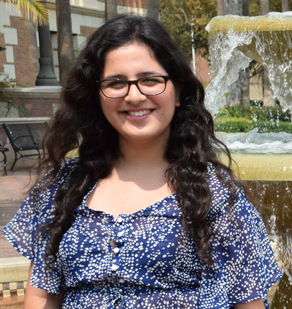
Natalie Kalbakian
She may be a Bruin, but Natalie Kalbakian is committed to working with the USC Shoah Foundation and its Armenian Genocide collection as one of the Institute’s newest interns.
Kalbakian is a junior at UCLA majoring in political science and minoring in film studies. She is also the vice president of the UCLA Armenian Students’ Association, which supports the Armenian student community and various Armenian causes.
She said she first heard about the USC Shoah Foundation while she was in high school and was inspired to become an intern when she heard Carla Garapedian, from the Armenian Film Foundation (AFF), speak about the new Armenian Genocide collection at the USC Shoah Foundation.
AFF’s J. Michael Hagopian recorded 400 testimonies of Armenian Genocide survivors from 1975-2005 on 16mm film. The fully digitalized collection was handed over to the USC Shoah Foundation in April 2014, with the goal of having the first set of testimonies integrated into the Visual History Archive in April 2015, the 100th anniversary of the genocide.
Kalbakian’s great-grandfather was the last Armenian Genocide survivor in her family to pass away, and she said the fact that her family was never able to record him telling his story was what motivated her to work for the USC Shoah Foundation.
“I was too young to realize how important it was to record his testimony, but this is what influenced my decision to intern,” Kalbakian said. “The Holocaust and Rwanda survivors who tell their stories give a voice to the orphaned generation from the genocide that didn't have that opportunity.”
So far, Kalbakian has been working with the executive team to edit testimony clips and assist with administrative duties. She hopes to help with the indexing process for the Armenian collection and learn about ethical editing as her internship continues for the rest of the summer and into the new school year.
UCLA ASA recently donated the proceeds of their annual Coachellian fundraiser to USC Shoah Foundation’s Armenian Genocide collection.
“We thought about what would be the most worthwhile thing to donate our money to, and with the centennial [anniversary of the Armenian Genocide] coming up the decision of the executive body was [the USC Shoah Foundation] was very important,” Kalbakian said. “We have at our school the privilege to have a genocide studies class, but it’s at the USC Shoah Foundation that there are these archives.”
This year, Kalbakian wants ASA to join with other UCLA student organizations such as the Jewish student group and Afrikans Student Union to meet with UCLA administration about making the school a Visual History Archive access site. This could be a “bridge” between USC and UCLA, Kalbakian said.
She said it’s important that the testimonies in the Visual History Archive are made available for all people to watch and learn about the causes and consequences of genocide. Testimonies can help people relate to what genocide survivors have gone through and be inspired to take action.
“To have the testimonies digitalized and have people get to see them, that’s most important,” Kalbakian said. “In the younger generation, we are very visual learners, so it does resonate a lot more with people to see survivors talking about what they went through – and that it’s not just their issue, it’s all of ours.”